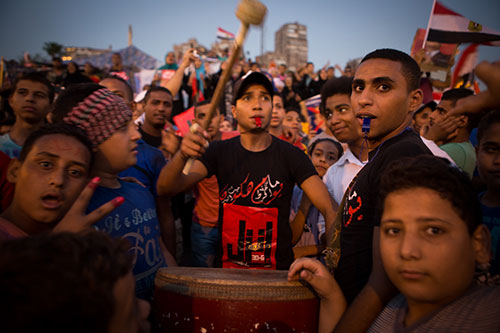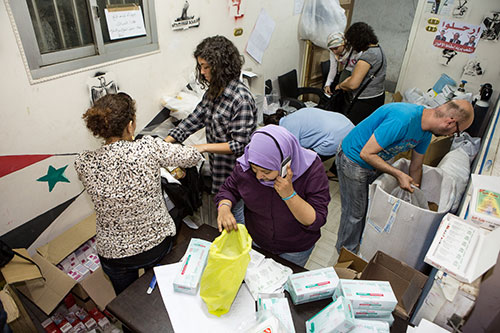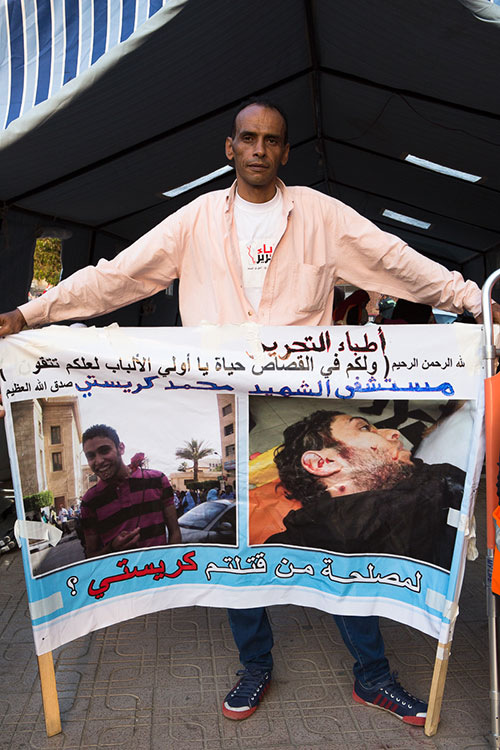PROVIDENCE, R.I. [Brown University] — During the upheaval in Egypt that led to President Hosni Mubarak’s fall from power, doctors’ efforts to remain neutral nevertheless constituted a political act. That is the finding of Sherine Hamdy, Brown associate professor of anthropology, and Soha Bayoumi, Harvard lecturer in the history of science in their new article “Egypt’s Popular Uprising and the Stakes of Medical Neutrality,” in the current special issue of the journal Culture, Medicine and Psychiatry.

Hamdy and Bayoumi explore how the political turmoil in Egypt in 2011 complicated Egyptian doctors’ professional commitment to medical neutrality – that is, to treating all sick and injured individuals without regard to their patients’ political stances and without interference.
The concept of medical neutrality – a duty to practice medicine impartially and with immunity from violent reprisals by individuals or the state actors responsible for the subjects’ injuries or illnesses – is articulated most fully in the Geneva Conventions in relation to warfare between states, Hamdy and Bayoumi note.
They grapple with Egyptian doctors’ attempt to apply this concept in the midst of intrastate political violence, arguing that medical neutrality can only be practiced and sustained under particular conditions.
“The practice… in fact requires a political stance that directly challenges the status quo of state violence and radical social inequality,” they wrote.
The notions and limits of medical impartiality and immunity
In the journal Hamdy and Bayoumi describe how doctors tended to and recorded the injuries of protesters who had been attacked by the police and military. In doing so, the doctors presented “a potent and radical challenge to the military regime’s stance that it is the only and ultimate sovereign authority to determine who can live and who can die,” the authors write.
In addition to challenging state authority by tending to the sick and injured, Hamdy and Bayoumi write, those who documented state violence directly refuted state propaganda about the nature of the authorities’ action to quell the protests. Similarly, doctors who treated injured police and military personnel were harassed by protesters sympathizing with those who wounded them, according to the paper.

Hamdy and Bayoumi argue that medical neutrality, which in practice would protect hospitals, patients, medical personnel and medical transportation from attacks, is a concept that assumes that war occurs between states. While medical neutrality is a problematic concept because “its goal is to civilize war rather than prevent or end it,” Hamdy said in an interview, “it is particularly bad for intra-state war,” in which there is a large-scale violation of citizens’ rights by the state’s military authorities.
Discussing the Egyptian military’s direct attacks on medical facilities in the paper, the authors wrote “…In erecting a ‘field hospital’ in the midst of a city that was not officially at war, it is unclear on what bases exactly the physicians had expected immunity to be extended to them.”
Intra-state violence also presents difficulties in appealing to international humanitarian organizations, Hamdy and Bayoumi write.
“Faced with a state that is all too willing to violate the basic humanity of its citizens,” Egyptian human rights organizations had difficulty engaging international humanitarian organizations, since if the latter “accuse their host state of violating the rights of its own citizens too loudly, they lose their ability to work there and potentially provide needed relief,” the authors observed.
Medical aid as a political response
Hamdy and Bayoumi identified a range of political responses to the violence during the uprisings among Egyptian doctors.
“Some physicians ignored it, others abetted, and still others challenged it, much like how Egyptians in wider society positioned themselves along a political spectrum,” they wrote.
While the authors identify medical volunteers at field hospitals as “undoubtedly on the side of the protesters,” others “carried out the military order to perform so-called ‘virginity tests’ on female protestors” or operated on protesters without anesthesia as punishment for participating in the demonstrations.
Among doctors treating patients regardless of their political stance, the phrase “medical neutrality,” Hamdy and Bayoumi argued, became less an impartial concept and more of “a potent way to justify and legitimate actions that the state’s riot police read as treacherous.”

Hamdy and Bayoumi also located a paradox in physicians’ identification with the concept of medical neutrality. As witnesses to the bodily consequences of state violence that the state wanted to suppress, the doctors’ confrontation of facts and forensic evidence had a moral weight, they write. By acknowledging patients’ gunshot wounds or breathing problems from tear gas, for example, doctors trying to practice medical neutrality had to observe evidence of military brutality. This put them in direct conflict with the authorities’ propaganda.
By contrast, in a 2010 case in which an Alexandrian man, Khaled Sa’id, was beaten to death outside of an internet café by police, the co-authors write, forensic examiners ignored factual evidence of that attack and falsified their report to concur with the police narrative that his death was drug-related.
So while doctors may have wished to perceive their own actions as “outside the realm of politics,” “to practice medicine at all was to take a stand against the State’s dehumanization of the protesters,” Hamdy and Bayoumi wrote.
Hamdy and Bayoumi’s analysis asserts that there was no neutral zone during the Egyptian uprisings in which doctors could practice medicine apolitically.
They concluded the paper by writing, “In invoking the notion of impartiality or neutrality, healthcare workers countered claims that subsume them as mere tools of power and attempted to model for a wider society a belief in common humanity, a belief sorely needed in times of political and civil strife.”